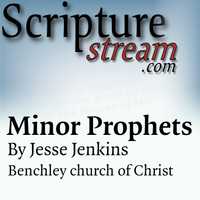Malachi
Introduction to the book
- Malachi’s name means “my messenger.”
- The book was most likely written around 435-432 BC.
- The general message of the book was for the people to clean up their lives and worship!
- The style of writing is more like a debate between the people and God.
Notes on the text
-
Malachi 1:1-5 – God declares His love for Israel.
-
Malachi 1:6-10 – The people offered unacceptable sacrifices. They people questioned the charge, but God listed their offenses in Malachi 1:7-8. They had worshiped according to their own desires.
-
Malachi 1:11-14 – Israel had profaned God’s name (Malachi 1:12), but it would be great among the Gentiles (Malachi 1:14). This prophecy was fulfilled in Christ.
-
Malachi 2:1-4 – Priests would not repent, and they were hopelessly cursed by God. See Exodus 29:14
-
Malachi 2:5-9 – The priesthood as God ordained it is compared to the actual state of the priesthood at that time. They had turned out of the way and caused people to stumble (Malachi 2:8).
-
Malachi 2:10-17 – The people had not respected God’s marriage law.
-
Matthew 19 – God’s marriage law. God hates divorce!
-
-
Malachi 3:1-7 – God’s messenger (John the Baptist) would come before Christ.
-
Malachi 3:8-15 – They had robbed God with their tithes.
-
Malachi 3:16-18 – God’s book of remembrance (looking forward to Christ). Compare Nehemiah 5:19.
-
Malachi 4:1-6 – The ultimate destruction of the wicked and triumph of the righteous.
- Malachi 4:5 – Elijah here is referring to John the Baptist (Matthew 17).
Lessons for us
- Honor God as a good son honors his father (Malachi 1:6).
- God will not accept an offering of scraps.
- We must be regulated by what God likes.
- God hates divorce.
- God writes the faithful in His book of remembrance.
- Those who walk not with God will be destroyed, but the righteous will enter the joy of their Lord.
- All acceptable preaching must have a “thus sayeth the Lord.”
